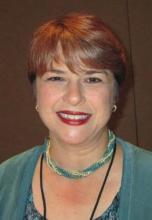LA JOLLA, CALIF. – When older patients with generalized anxiety disorder refuse to begin a course of medication treatment for their symptoms, Julie Wetherell, Ph.D., builds a case for why they should reconsider.
"I’ll say something like, ‘We can try to approach your problem without medication, but the evidence suggests that a pharmacotherapy approach carefully tailored and closely monitored may be more helpful for you than what we’re going to be able to do without medication,’ " she told people attending the annual conference of the Anxiety and Depression Association of America.
"After seeing enough data and enough cases where it was really difficult for me to make a dent without some kind of medication on board, I have come to a realization that I need to start that discussion up front. And if they’re willing to try a medication, I refer them to a geriatric psychiatrist colleague to make sure that the medication they end up taking is safe and appropriate."
Dr. Wetherell, a psychotherapist in the psychiatry department at the University of California, San Diego, likes to begin older patients with generalized anxiety disorder (GAD) on a course of relaxation training, "because it seems to be as effective, if not more so, than the full CBT [cognitive-behavioral therapy] package for GAD in later life," she said. "For panic disorder in older adults, the data are starting to look more positive. A recent study found that CBT was as effective as an SSRI [selective serotonin reuptake inhibitor] medication. Unfortunately, we still don’t know a lot about the effects of CBT on PTSD [post-traumatic stress disorder] and phobias in older people."
For those who do not respond to psychotherapy alone, Dr. Wetherell often employs motivational interviewing techniques, because anxious older adults "are often reluctant to take medication because of sensitivity to somatic sensations and worry about possible negative effects," she said. "In motivational interviewing, I frame the situation to note that taking medication is a way of taking charge of their health; it’s empowering. Many times for people who are anxious, the issue is a feeling that they are not in control of their environment and bad things could happen."
Informing patients that it might be possible to discontinue medication after a short-term course of treatment in conjunction with psychotherapy also is plausible, Dr. Wetherell said. "When people find out this isn’t something they necessarily need to be on forever, they can view the medication more like an antibiotic rather than like their blood pressure medication, which they know they’re likely to have to take for the rest of their lives."
She advises against prescribing medication for GAD patients on Fridays, because "someone can take the medication, experience something that they interpret as a side effect, not be able to get ahold of anyone, and then stop the medication over the weekend," she explained. "Call or have someone in your office call the patient 1 day after they start the medication and 4 days later, and try to see that person for a visit after 1 week. Talk about how it’s going and address any concerns, side effects, or sensations that may be troublesome."
Useful questions to consider about side effects include: "How bad is it right now, at this moment?" And "is it incapacitating?" "Usually, the answer is that it’s not too bad while they’re talking to you, so you can use that to encourage them to stay the course," Dr. Wetherell said. "And because I don’t prescribe medications myself, I always call the prescriber right away and ask them to call the patient within 24 hours to make sure that any medical issues are addressed."
Providing a phone number where patients can reach you 24/7 is a good practice, she continued, because anxious older adults "are often really sweet, and they don’t want to impose on anyone or be a burden. I’ve never had anyone call me after hours, but I think the idea that ‘we’re here for you if you have a problem’ is reassuring."
When conducting psychotherapy with older people, involving the family "can be really important," Dr. Wetherell said. "Working at a slower pace with repetition enhances learning. I like to use multimodal approaches if possible." This might include giving instructions or educational material in writing, or even audiotaping treatment sessions to afford them another opportunity to digest what was discussed.
Dr. Wetherell underscored the importance of collaborating with clinicians in other specialties to care for this patient population. "The model of a psychotherapist in a silo seeing an older person come and go doesn’t work," she said. "It’s vital that we work with colleagues not only in psychiatry but also in primary care and in rehabilitation. Unfortunately, we’re not all embedded in systems where that is easy, but it’s important to reach out to our medical colleagues and enlist them as allies, because mental health problems like anxiety or depression are going to affect the conditions that other providers are treating as well."


